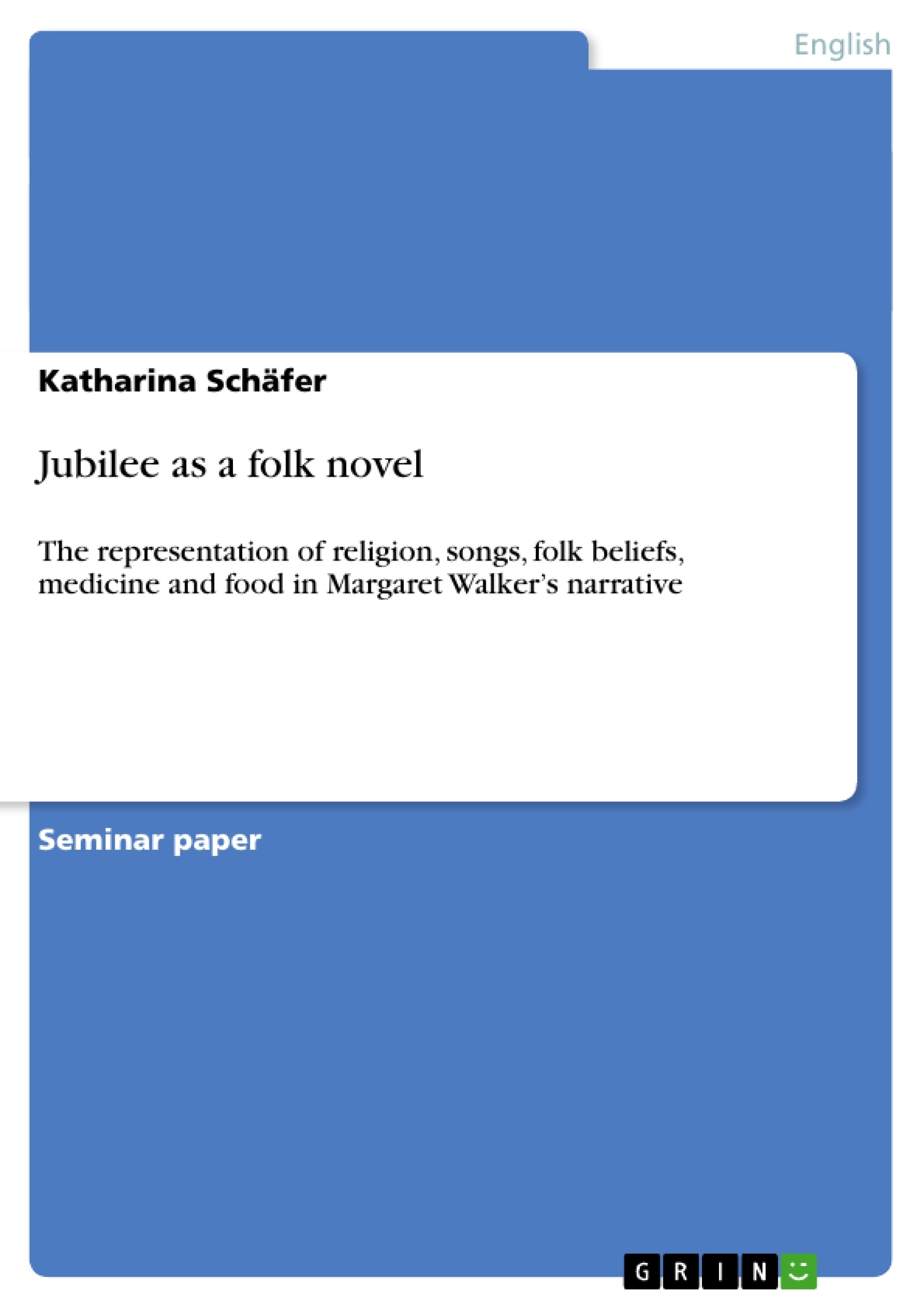On nearly 500 pages Margaret Walker tells the story of her great-grandmother. Jubilee is the story about Vyry, a black female slave who longs for freedom and finally gains it, at least officially, after the Civil War years. Besides this individual destiny, the novel contains historical sections and information about political developments during that time, several complex characters in addition to Vyry and inside views even of white characters, detailed descriptions of the slaves’ everyday life, their family structures, their language and their hierarchies. My term paper will deal with those elements which turn Jubilee into a folk novel, i.e. an account of African American traditions which were passed from generation to generation orally. It was clear to me that Walker had intended to write a kind of folk novel when I read
her dedication: She dedicated her first and only novel to her family, especially to her
four children so “that they may know something of their heritage”. Apparently, family
boundaries and traditions do not only play a major role in the novel but also did in
Walker’s own life. After reading Walker’s essay “How I wrote Jubilee” there was
further evidence found for my initial intuition. There she mentions: “I always intended
Jubilee to be a folk novel based on folk material: folk sayings, folk belief, folkways.”
(Walker 1973: 62). Furthermore, the origin of Jubilee is a piece of oral tradition itself.
According to the same essay, her grandmother had told her stories about slave life in
Georgia ever since she was a child (Walker 1973: 51). As an adult she carried out a
long-lasting research because she was determined “to authenticate the story I had
heard from my grandmother’s lips” (Walker 1973: 56). The task of this term paper will be to find instances where its characteristics as a
folk novel become obvious. To fulfil this task I will begin with a summary of the novel
and I will provide a working definition of the term “folklore”. Afterwards there will be a
closer investigation of some folkloric categories which are represented in Jubilee.
Table of Contents
- Introduction
- About this term paper
- About the novel
- A working definition of "folklore"
- Folkloric elements found in Jubilee
- Religion
- Songs
- Folk Beliefs and Conjure
- Medicine and Nursing
- Cooking and Food
- Conclusion
- Bibliography
Objectives and Key Themes
This term paper aims to analyze the novel "Jubilee" by Margaret Walker, focusing on its characteristics as a folk novel. The paper explores how Walker represents African American traditions passed down through generations, and how these traditions shape the narrative and characters.
- The portrayal of African American folklore in the novel.
- The significance of oral traditions in shaping the narrative.
- The use of folklore to convey themes of resilience, community, and cultural identity.
- The role of religion, songs, and folk beliefs in the lives of the characters.
- The relationship between the novel and the genre of neo-slave narratives.
Chapter Summaries
The first section of the novel, set during the antebellum era (1839-1860), introduces Vyry, a slave woman on the Dutton plantation. The narrative explores Vyry's experiences as a slave, including the death of her mother, her harsh treatment by her mistress, and the role of Aunt Sally as a surrogate mother. The section culminates with Vyry's secret relationship with Randall Ware, a free black man, and her failed attempt to escape with her children.
The second section focuses on the Civil War years (1861-1865). The Dutton Plantation faces numerous losses, including the death of Master John and Lillian's husband and brother. The Emancipation Proclamation is announced, freeing the slaves. Vyry and her children remain on the plantation and experience the turbulent aftermath of the war.
The third section, covering the Reconstruction period (1866-1870), depicts Vyry and Innis Brown's journey to establish a new life in Alabama. They encounter challenges, including flooding, exploitation, and the Ku Klux Klan. Vyry finds acceptance as a midwife in the community, but her past continues to haunt her with the return of Randall Ware.
Keywords
The key concepts and themes explored in this paper include African American folklore, neo-slave narratives, oral traditions, resilience, community, cultural identity, religion, songs, folk beliefs, conjure, medicine, and food. The paper examines the influence of these elements on the narrative and characters of "Jubilee."
- Quote paper
- Katharina Schäfer (Author), 2007, Jubilee as a folk novel, Munich, GRIN Verlag, https://www.grin.com/document/93880




